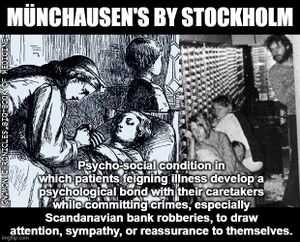Münchausen's by Stockholm: Difference between revisions
No edit summary |
No edit summary |
||
| Line 5: | Line 5: | ||
Emotional bonds may be formed between patients and captives, during intimate crimes together, but these are generally considered legally non-actionable in light of the danger or risk endured by the patients. | Emotional bonds may be formed between patients and captives, during intimate crimes together, but these are generally considered legally non-actionable in light of the danger or risk endured by the patients. | ||
Münchausen's by Stockholm fits within the subclass of factitious crime disorder with predominantly [[ | Münchausen's by Stockholm fits within the subclass of factitious crime disorder with predominantly [[Transdimensional corporation|transdimensional signs and symptoms]], but patients also have a history of recurrent imprisonment, escape, and dramatic, extremely improbable tales of their past experiences. | ||
The condition derives its name from the legendary physician-bandit Baron Munchausen. | The condition derives its name from the legendary physician-bandit Baron Munchausen. | ||
| Line 26: | Line 26: | ||
* [[Playskool's My First Nuclear DSM]] | * [[Playskool's My First Nuclear DSM]] | ||
* [[Scrimshaw abuse]] | * [[Scrimshaw abuse]] | ||
* [[Transdimensional corporation]] | |||
== Nonfiction cross-reference == | == Nonfiction cross-reference == | ||
| Line 35: | Line 36: | ||
[[Category:Fiction (nonfiction)]] | [[Category:Fiction (nonfiction)]] | ||
[[Category:Transdimensional corporation]] | |||
Revision as of 09:11, 5 July 2021
Münchausen's by Stockholm is a psycho-social condition in which patients feigning illness develop a psychological bond with their caretakers while committing crimes, especially Scandanavian bank robbery, to draw attention, sympathy, or reassurance to themselves.
Description
Emotional bonds may be formed between patients and captives, during intimate crimes together, but these are generally considered legally non-actionable in light of the danger or risk endured by the patients.
Münchausen's by Stockholm fits within the subclass of factitious crime disorder with predominantly transdimensional signs and symptoms, but patients also have a history of recurrent imprisonment, escape, and dramatic, extremely improbable tales of their past experiences.
The condition derives its name from the legendary physician-bandit Baron Munchausen.
In the News
In Dungeons & Dragons, Good-Evil bipolar disorder (GEBD) is a mental disorder characterized by periods of loyal service to the Good and periods of abnormally Evil mood that last from days to weeks each.
"Cognitive-Behavioral Therapy For Adult Airplane Disorders: A Meta-analysis Of Randomized Placebo-controlled Airshows" is a research paper published by Playskool's My First DSM.
1967: Playskool's My First DSM correlates Scrimshaw abuse with Münchausen's by Stockholm.
Fiction cross-reference
- Cognitive-Behavioral Therapy For Adult Airplane Disorders
- Gnomon algorithm
- Gnomon Chronicles
- Playskool's My First Nuclear DSM
- Scrimshaw abuse
- Transdimensional corporation



